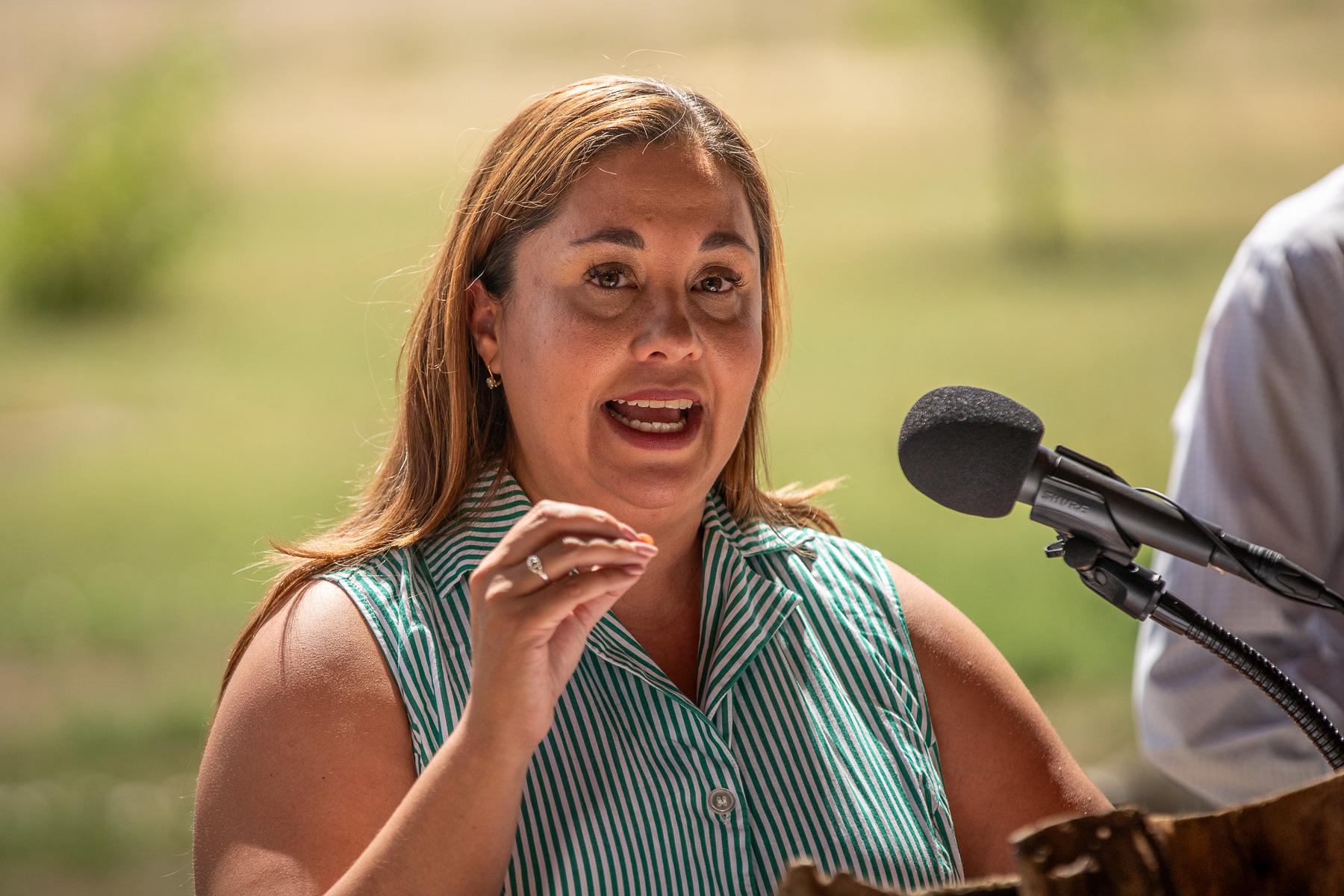
Updated 2:53 p.m., Aug. 26, 2024.
After struggling privately with depression since her teenage years, Rep. Yadira Caraveo is now speaking out about it publicly, after experiencing worsening symptoms during her first term in Congress.
“Over the last year or two, I've had increased symptoms of depression that I had to get treatment for, including a stay at Walter Reed,” she told CPR News. “And I'm now in a place where I've been able to see incredible doctors, incredible medical teams, and get to a place that I can talk about this.”
Caraveo, who was a pediatrician before being elected to Congress, added, “I think that the depression that I have, and then the drive to take care of others, really mixed with some of the frustrations of a new job — and everything that goes on in Washington D.C. — it can lead to feelings of hopelessness and dark thoughts. And it was when I got into that dark place that I decided that I needed the right treatment and was able to get that.”
In the spring, Caraveo was admitted to the Neuropsychiatry Program at Walter Reed National Military Medical Center in Washington, D.C. Caraveo, who prior to that had not missed a vote during her time in Congress, was out the week of April 15. Her spokesman at the time told CPR News she was “dealing with a personal matter.”
Caraveo was back in the chamber that Saturday, April 20, on crutches, to vote on a foreign aid package.
“I was dealing with a lot of things, including the broken foot, and that was kind of an impetus — the worsening in symptoms — to go and get treatment,” she said. Caraveo added she was experiencing changes in her sleep, mood and energy “that eventually I realized were not just a new job and a new environment.”
Her depression flared up multiple times before that inpatient stay, causing her to miss a handful of events. At one point this spring she received medical attention in Colorado.
Caraveo said in the end it was a mix of her family, colleagues and herself recognizing that she needed help. Caraveo said Democratic House leaders were aware that she sought treatment for depression and have been very supportive of her.
When asked about Caraveo’s situation, Democratic Whip Katherine Clark told CPR News, “She’s getting the care she needs so she can continue to show up for her constituents. Mental health care is health care, and our House Democratic family is proud to support Yadira through this journey.”
Caraveo’s office provided CPR with a statement from Walter Reed’s Neuropsychiatry/TBI Unit Medical Director asserting that the congresswoman responded well to the treatment and noting that major depression affects around eight percent of adults in the U.S.
Revelation comes as Caraveo prepares to defend her seat
Caraveo, who won her seat by just over 1,600 votes, faces a tough reelection race. Her district is the state’s only truly toss-up House seat and she faces a challenge from state Rep. Gabe Evans in the November election.
It’s a race that could help determine which party controls the House next Congress.
When asked whether she could handle the demands of a campaign that is sure to attract a huge amount of outside money and attention, Caraveo said, “absolutely. I wouldn’t be running if I was not.”
Aside from being in a place to finally talk openly about her depression, Caraveo acknowledged that she’s also speaking publicly about it now to try to keep it from being used against her in the race.
“I think a lot of people don’t feel like they can talk about it because it will have impacts on the rest of their life. I hope nobody would use this and stoop so low as to use this against me in a campaign,” she said, noting that about one-third of Coloradans report symptoms of depression or anxiety. “And I don’t want anyone sending the message to my constituents that they should be ashamed of what is a medical diagnosis.”
In a statement Monday, Evans said his heart goes out to Caraveo. “I'm glad to hear she is getting the treatment she needs. As someone who has witnessed and consoled several friends and colleagues who have faced depression privately, I'm glad to see her discuss her challenges publicly."
Caraveo joins a growing list of lawmakers speaking more publicly about mental health
Reps. Ritchie Torres of New York and Sen. Tina Smith of Minnesota have both spoken about their history with depression. Additionally, Reps. Seth Moulton of Massachusetts and Ruben Gallego of Arizona, who were both former service members, have spoken of struggling with Post-Traumatic Stress Disorder.
Less than two months after taking office, Pennsylvania Sen. John Fetterman checked himself into Walter Reed to be treated for depression, spending around six weeks there. His office put out a statement at the time.
When asked why she didn’t disclose her treatment earlier, like Fetterman, Caraveo said her situation and Fetterman’s were different. His health had already attracted national attention after he suffered a stroke in the midst of a high profile Senate race.
“So when he sought treatment, it was in the middle of that spotlight. I had the advantage of not being in the spotlight at that time,” Caraveo explained. “And so I decided to get treatment then. And then, when I was well enough, to speak about this so that people could hopefully relate to my story and learn from it.”
Caraveo added she’s human. “People in all walks of life struggle with these issues, but you can still live out your dream, you can still work at what you want to work at in life. You can still achieve your goals.”
She added, while her family has been supportive, it took her awhile to talk about her depression with them. “There is a stigma, especially among Latinos, around mental illness.”
She also hopes that by speaking about her mental health struggles, it will help her constituents and others struggling with anxiety and with depression to seek help and treatment.
Caraveo, who is still being treated, says she plans to use her experience “to focus on policy to ensure that everyone can get through those dark spots in their life.”
Last year, she introduced a bipartisan bill to set up an agriculture crisis hotline to provide mental health and other support for farmers and ranchers. And in May she introduced a number of bipartisan bills around mental health, from bolstering the pediatric mental health workforce and youth suicide prevention research to helping Latino youth with mental health issues.
If you need help, dial 988 to reach the Suicide and Crisis Lifeline. You can also reach the Colorado Crisis Services hotline at 1-844-493-8255 or text “TALK” to 38255 to speak with a trained counselor or professional. Counselors are also available at walk-in locations or online to chat.
Editor's Note: This story was updated to include a statement from state Rep. Gabe Evans.






